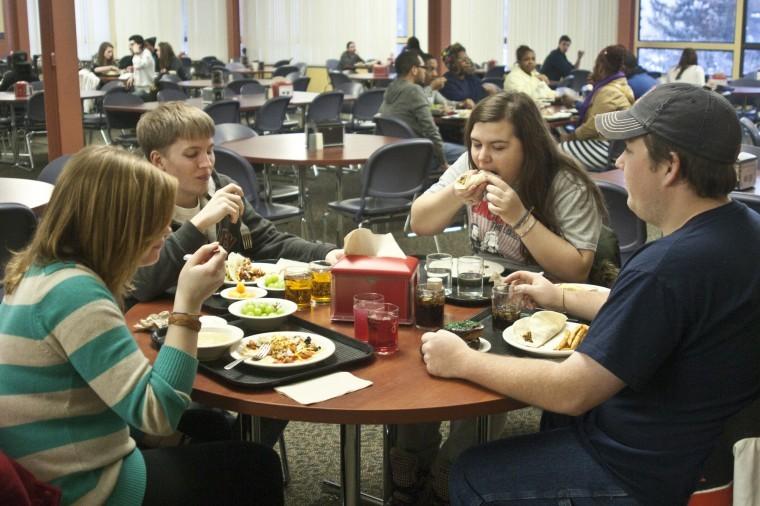Changes to Neptune dining hall procedure designed to reduce waste
From left to right: Aiyana Emsun, sophomore music education major, senior geology major Will Blair, Sophomore music major Samantha Raines, and sophomore music major Andrew Voelker eat dinner in Neptune’s all-you-can-eat dining hall in Neptune Central Monday evening.
January 23, 2012
Students used to serving themselves food at Neptune Hall now will have it served to them.
Richard Fritz, director of residential dining, came up with the idea of having meals served to students after studying the amount of food waste last semester, said Audrey Maxey, food administrator for housing and dining.
The study’s results showed a significant amount was wasted, Fritz said. The average amount of food waste per day at Neptune is 257 pounds, according to a story board posted near Neptune dining hall.
Previously, the staff noted the amount of wasted food traveling down the conveyor belt to be trashed, Maxey said. Fritz decided to weigh the food to see how much was wasted, Maxey said.
“Sometimes you need a new set of eyes,” Maxey said.
Serving the food will help cut food waste but not stop it, Fritz said. Individual stewardship is what will help reduce food waste, Fritz said. Students will be able to interact more with the dining staff, many of them students themselves, and the dining staff will benefit by gaining customer service skills, Fritz said.
“We want to more distinctly provide the service portion of the dining service,” Fritz said.
Most of the other dining halls have an “all-you-can-eat” where the dining staff serves the students, said Neptune student manager Megan Maloney. The new service is not about limiting food served, but cutting back on the food waste, Maloney said.
“The less food that is wasted, the more food budget we have to spend on menu items,” Fritz said.
Maloney said there has been less food waste, and certain food items are not being consumed as quickly.
The new service was planned for the spring semester instead of fall to prevent confusion with students adjusting to the meal service, Fritz said. The responses to the change have been mixed, Fritz said.
Freshman marketing major Dylan McGowan said the new service seems fine, and if you want more food, you can always get more.
McGowan said he thinks people still waste food because they are not eating as much as they ask for.
Lonnie King, sophomore business administration major, said the service makes him feel like a child because he has to ask for food he already pays for through his tuition.
“Honestly, they could have kept it the same,” King said.
The portions are smaller and it is more convenient if students receive the food they need all at once, King said. Standing in line for more food takes more time because the lines are longer, and there are fewer people serving the food, King said.
Students usually take one item, like fries, and then come back for more, Maloney said. Though students now have to decide what kind of meal they want before hand, there are signs to help.
“We’re trying to move people through as fast as we can so they can get what they want and come back,” Maloney said.
Another study will be done later in the semester to compare food waste with the previous semester, Fritz said.



